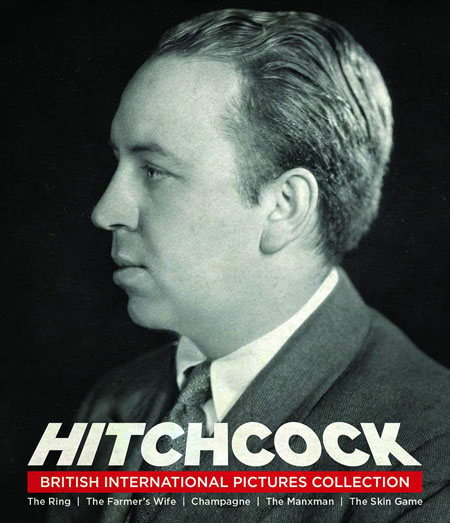
“HITCH
FINDING HIS WAYâ€
By
Raymond Benson
While
there are many DVD collections (and VHS anthologies before that) of the early British
material directed by Alfred Hitchcock in the 1920s and most of the 1930s, there
are very few that contain decent transfers. The silent films, until recently,
all existed in extremely poor quality, as so did most of the British sound
pictures. Companies like The Criterion Collection and Kino Lorber have begun to
finally restore these classics in high definition Blu-ray. (There is a
long-held belief that these titles are in the public domain, but this is
false.)
The
new 2-disk Kino Lorber set, British International Pictures Collection,
contains a handful of these early movies—The Ring (1927), The
Farmer’s Wife (1928), Champagne (1928), The Manxman (1929),
and the only sound feature in the bunch, The Skin Game (1931). They all display
Hitch finding his way, exploring the possibilities of the medium, and trying to
find his directorial “voice.†He was not yet the “Master of Suspense,†even
though he had made one silent masterpiece thriller, The Lodger (1927),
that kick-started his career. He did not yet have the clout to pick and choose
his projects, so he directed whatever the studio assigned him. Too often, the
titles were melodramas that bore little resemblance to the kinds of things
Hitchcock would make once he had established his nickname.
The
good news is that mostly these are beautifully restored transfers that look
better than any previous iteration this reviewer has ever seen. In fact, the
silent pictures look remarkable—Kino has done a splendid job in the
presentation. (Oddly, the later title, The Skin Game, doesn’t look as
good as the earlier ones, but it’s still more watchable than previous
versions.)
The
bad news is that none of these titles are stellar entries in Hitchcock’s oeuvre.
In fact, only Hitchcock completists will get much out of this set, as admirably
put together as it is.
The
Ring
is unique in that Hitchcock himself is credited with writing the screenplay—the
only time in his entire filmography in which this is the case. Apparently,
Hitch was a boxing fan and wrote the story about a love triangle between two
fighters and the girl for whom they both have the hots. Hitchcock told François
Truffaut in their famous interview that he considered The Ring to be the
second “true†Hitchcock movie (after The Lodger). Personally, this
reviewer finds it to be overly long, melodramatic, and slow.
The
Farmer’s Wife
is one of Hitchcock’s few comedies—a romantic comedy, to boot. It’s
about a middle-aged farmer who becomes a widower and then sets about finding a
new wife. Every woman he asks rejects him, until he realizes that his
housekeeper will do just fine. (Believe it or not, that’s not a spoiler.)
Again, the film is too lengthy and moves too slowly to be a comedy. Certainly
not in the upper pantheon of Hitchcock classics.
Champagne is worse. Also billed
as a “comedy,†it’s about a young woman from a wealthy family who is reckless
and chases after a fellow who seemingly doesn’t want her. The woman’s father falsely
declares bankruptcy to pull in her spending reins, but to no avail. In the end,
the poor schmuck she was after ends up by her side after all (again, not a
spoiler!).
The
Manxman
is so dreary and lifeless that it’s almost impossible to think that such a
great filmmaker as Alfred Hitchcock made it. It’s another love triangle story
in which the “Manxman†(a citizen of the Isle of Wight) goes away to find fame
and fortune in Africa, leaving his beloved under the watchful gaze of his best
friend. You can guess what happens between the beloved and the friend. Again—too
long and too slow. Thank goodness Hitchcock rebounded from this with his first
talkie, Blackmail, and proved that he really could direct a movie.
The
Skin Game was
Hitch’s fourth sound picture. It’s not terrible, but it’s not particularly
good. It’s about two families of different social classes feuding over land.
The richer family learns something scandalous about the daughter of the
less-richer family and threatens blackmail. Edmund Gwenn (who starred in more
than one Hitchcock title) is effective as the indignant head of the less-wealthy
household. Of all the films in this collection, The Skin Game is the
most interesting, and it’s not because it’s a talkie. There is some real drama
going on, it’s just that there’s a lot of “melo-†to it.
Along
with the superb high definition transfers, there are audio commentaries by film
historian Farran Smith Nehme on Champagne and The Manxman, and by
Nick Pinkerton on The Ring. New lovely scores accompany the silents—by
Meg Morley (The Ring), Jon Mirsalis (The Farmer’s Wife), Ben
Model (Champagne), and Andrew Earle Simpson (The Manxman).
Finally, the only supplements are two audio excerpts from the
Hitchcock/Truffaut interview related to the films in question.
Despite
the so-so quality of the films themselves, the British International
Pictures Collection does present outstanding editions of these early Alfred
Hitchcock features—certainly worthwhile for any student and aficionado of the
master during a crucial learning period of his profession.
CLICK HERE TO ORDER FROM AMAZON